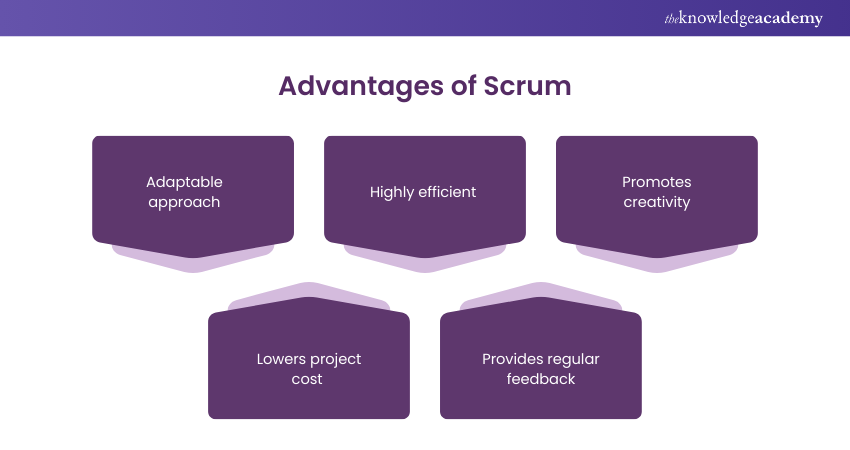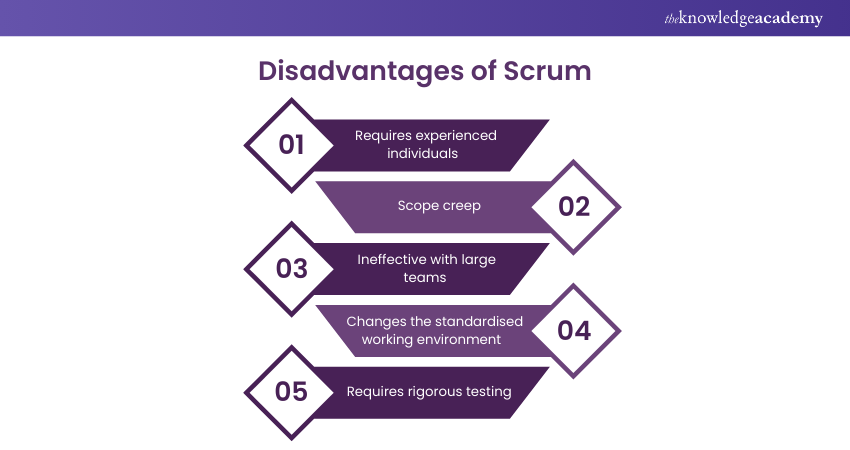We may not have the course you’re looking for. If you enquire or give us a call on +36 18508731 and speak to our training experts, we may still be able to help with your training requirements.
We ensure quality, budget-alignment, and timely delivery by our expert instructors.

Imagine your project as a thrilling sports match—dynamic, fast-paced, and unpredictable. Scrum, the star athlete adopted by over 58% of organisations globally, executes the game. It splits the action into iterative Sprints, much like quarters or overs, enabling teams to adapt strategies mid-play and deliver peak performance.
Scrum’s versatility shines across industries, from slashing costs to sparking creativity, but every MVP has limitations. Scrum, too, faces hurdles like needing skilled players and struggling with larger fields of play. In this blog, we’ll unpack Scrum’s pros and cons to help you decide if it’s the winning strategy for your project.
Table of Contents
1) What is Scrum?
2) Scrum Process
3) Advantages of Scrum
4) Disadvantages of Scrum
5) Conclusion
What is Scrum?
Scrumis defined as the Agile Project Management framework that organises tasks into repeated cycles, which are referred to as Sprints. The Scrum Team monitors work delivery, while the product owner acts as an intermediary between stakeholders to reflect upon their tasks and priorities.
Scrum originated in the software sector but is now applied across various industries. It helps teams iteratively improve and adapt to changing demands, ensuring alignment with project objectives.
Scrum Process
To effectively implement Scrum, it’s important to understand the step-by-step workflow that guides teams through Project Management. It basically comprises these processes:
1) A Product Owner creates a list of all the necessary tasks to achieve the project and prioritises them into a Product Backlog.
2) The Scrum Team then reviews and inspects this Product Backlog and divides the bigger tasks into small pieces that are easier understandable and quicker to execute.
3) After the task review process, the team generates the Sprint Backlog and agrees to implement the tasks. Although it’s important to note that when generating the Sprint backlog, the team also establishes each Sprint’s length with the typical duration, ranging between two to four weeks.
4) The squad holds Daily Scrum Meetings, referred to as Standups, during a Sprint. In these meetings, team members report on progress and potential difficulties to their team leaders. The project manager then evaluates the project based on the information received.
5) Lastly, the Product Owner and the organisation’s stakeholders perform a review meeting at each Sprint's end, and the team conducts a Sprint Retrospective to examine and improve their working process.
What are the Advantages of Scrum?
Whether it is Software Development or Medical Sector, Scrum can easily get the work done by continuously experimenting and providing feedback to boost product quality. While this is only the single quality, there are many other advantages to this method. Let take a look at some of them:

Adaptable Approach
The Scrum approach mainly relies on project adaptability. If your organisation lacks pre-defined goals or identifiable requirements at the beginning of the project, Scrum is a hugely helpful methodology. It majorly operates in Sprints, where changes required in one Sprint can be implemented during the other. Therefore, it helps to change any project without impacting the results.
Highly Efficient
Scrum Team size is usually small, meaning each member takes complete credibility to own up to their work, which results in better work quality. Moreover, as the work is divided among teams, timely product bottleneck predictions and quick solutions become primarily common.
Promotes Creativity
During the product development process, the projects are continually monitored. This allows the team to scrutinise areas for improvement and smoothens the work process. As a result, brainstorming with team members to nudge creative ideas and perform regular tasks is involved.
Lowers Project Cost
By minimising excessive documentation, actionable plans, and user stories, Scrum can reduce Overhead Costs in comparison to conventional methods. These plans provide a clear and concise roadmap for developers, allowing them to focus on the current tasks instead of wasting time on paperwork.
Provides regular feedback
The daily Scrum meetings facilitate progress updates, identification of impediments, and team collaboration to maintain alignment with Sprint goals. Furthermore, this daily feedback helps the project to function smoothly in the long run.
Transparent
As methodology involves providing regular feedback and ensuring each team member's participation, even small modifications made in the project (at any level) are visible to all the team members. Thus, this builds trust and ensures the delivery of finer products, further promoting transparency.
As methodology involves providing regular feedback and ensures each team member's participation, even little modifications made in the project (at any level) are visible to all the team members. Thus, this builds trust and ensuring the delivery of finer products, further promoting transparency.
Learn everything from Scrum scratch- register for our Scrum Master Certification now!
What are the Disadvantages of Scrum?
Although the Scrum methodology has a plethora of advantages, people still prefer other approaches for Project Management. The clear reasons are Scrum's Disadvantages. Therefore, as a professional, you should be aware of these disadvantages to make clear decisions. Some of the Disadvantages of Scrum are as follows:

Although the Scrum methodology has many advantages, people still prefer other Project Management approaches. Therefore, it is better to be familiar with Scrum's Disadvantages to know whether this approach is for you. Some of the Disadvantages of Scrum are as follows:
1) Requires experienced individuals
Organisations typically require highly skilled and experienced employees to develop Scrum projects. If your employees lack any prior related experience, it might be difficult to operate projects. Moreover, employee training also adds to the cost.
2) Scope creep
Scrum projects are iterative and flexible but can still have pre-determined timelines or milestones based on the agreed scope and deliverables. So, if any member quits during the process the chances of failure of the project gets amplified.
3) Ineffective with large teams
The Scrum framework is not designed to handle extreme larger projects as it will require a larger team to maintain the Scrum Workflow. It further implies a communication lack among the large team within the Scrum workflow. Moreover, these projects might sometimes become hard to understand and implement.
4) Changes the standardised working environment
It can be challenging to work with the organisational hierarchy using Scrum. Scrum requires collaboration between the Product Owner, Scrum Master, and the Development Team. This breaks traditional hierarchical structures to promote teamwork and flexibility.
5) Requires rigorous testing
Scrum is a specific Agile process that focuses on delivering business value iteratively through continuous inspection, adaptation, and collaboration. Its teams focus on delivering working software every sprint while continuously improving their work.
Scrum is a specific Agile process that focuses on delivering business value iteratively through continuous inspection, adaptation, and collaboration. Its teams focus on delivering working software every sprint, while continuously improving the way they work.
Download the Professional Scrum Developer PDF and enhance your Scrum skills today!
Conclusion
We hope you understand the Scrum Advantages and Disadvantages. Knowing about these aspects of Scrum will help your organisation in an abundance of ways by providing transparency and efficiency to your projects. However, it can be scope creep and test your patience through inefficiency with larger teams and rigorous testing. So, it is recommended that you consider choosing Scrum from all dimensions for a transparent and seamless work project. Additionally, understanding why you should choose the Scrum Master certification can help you navigate these challenges effectively.
Master Scrum team’s responsibilities to uplift your career- register for our Scrum For Teams Course now
Frequently Asked Questions
Why is Scrum So Effective?

Scrum is effective because it promotes collaboration, adaptability, and transparency. Teams can quickly deliver value and adapt to changes by breaking work into small, manageable sprints. Moreover, it continuously improves through regular feedback loops, fostering accountability and focus.
What are the Problems With Scrum?

Scrum challenges include strict rule adherence, team burnout, scaling difficulties, and maintaining stakeholder engagement. Agile emphasises iterative development, while Scrum focuses on delivering business value through rapid software inspections.
What are the other resources and offers provided by The Knowledge Academy?

The Knowledge Academy takes global learning to new heights, offering over 3,000 online courses across 490+ locations in 190+ countries. This expansive reach ensures accessibility and convenience for learners worldwide.
Alongside our diverse Online Course Catalogue, encompassing 19 major categories, we go the extra mile by providing a plethora of free educational Online Resources like News updates, Blogs, videos, webinars, and interview questions. Tailoring learning experiences further, professionals can maximise value with customisable Course Bundles of TKA.
What is the Knowledge Pass, and how does it work?

The Knowledge Academy’s Knowledge Pass, a prepaid voucher, adds another layer of flexibility, allowing course bookings over a 12-month period. Join us on a journey where education knows no bounds.
What are Related Scrum Courses and Blogs Provided by The Knowledge Academy?

The Knowledge Academy offers various Scrum Courses, including Scrum Certification, Product Owner and Scrum Developer Courses. These courses cater to different skill levels, providing comprehensive insights into Scrum Tools for Project Management.
Our Project Management Blogs cover a range of topics related to Scrum, offering valuable resources, best practices, and industry insights. Whether you are a beginner or looking to advance your Project Management skills, The Knowledge Academy's diverse courses and informative blogs have you covered.
Upcoming Project Management Resources Batches & Dates
Date
 Scrum Master Certification
Scrum Master Certification
Thu 20th Feb 2025
Thu 27th Feb 2025
Thu 6th Mar 2025
Thu 13th Mar 2025
Thu 20th Mar 2025
Thu 27th Mar 2025
Thu 3rd Apr 2025
Thu 24th Apr 2025
Thu 1st May 2025
Thu 22nd May 2025
Thu 5th Jun 2025
Thu 19th Jun 2025
Thu 3rd Jul 2025
Thu 17th Jul 2025
Thu 31st Jul 2025
Thu 14th Aug 2025
Thu 11th Sep 2025
Thu 25th Sep 2025
Thu 2nd Oct 2025
Thu 9th Oct 2025
Thu 16th Oct 2025
Thu 23rd Oct 2025
Thu 30th Oct 2025
Thu 6th Nov 2025
Thu 13th Nov 2025
Thu 20th Nov 2025
Thu 27th Nov 2025
Thu 4th Dec 2025
Thu 11th Dec 2025
Thu 18th Dec 2025






 Top Rated Course
Top Rated Course



 If you wish to make any changes to your course, please
If you wish to make any changes to your course, please


